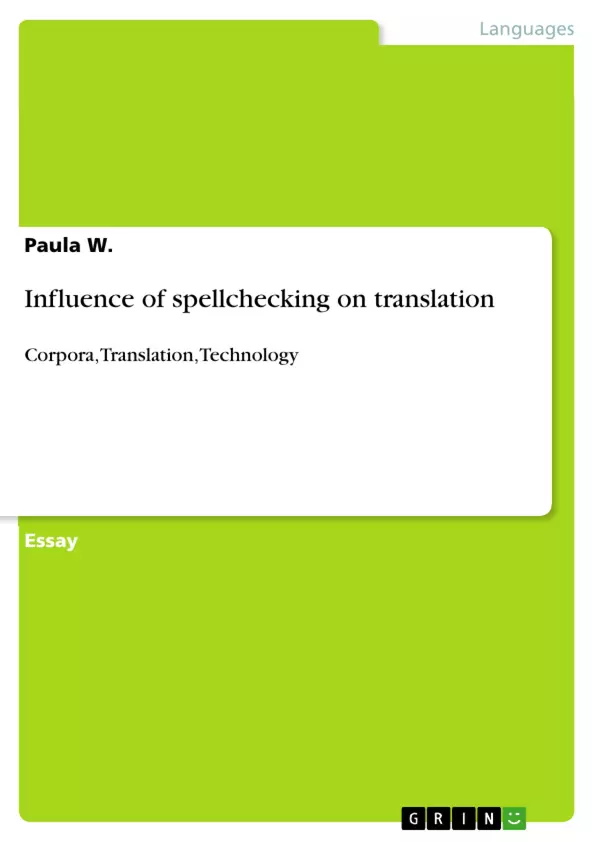A computer program, that identifies possible misspellings in a block of text by comparing the text until a database of accepted spellings, is called a spell-check or spell-checking. Spellcheck is also mostly defined as a computer program used to process a document in order to check the spelling. The purposes of spellchecking are very simple: they are very useful to control the accuracy of the spelling of an electronic document and to correct misspellings and errors. The Oxford dictionary (2013) states: “the text show signs of having been spellchecked but not proof-read”. This last explanation reveals the difficulties implicated by referring to spellchecking (...)
Inhaltsverzeichnis (Table of Contents)
- Introduction
- History and evolution of spellchecking
- Relevance and complexity of spellchecking due to various processes:
- Dictionary-free spellchecking
- Dictionary-based spellchecking
- Improvements of Spellchecking by projects research
Zielsetzung und Themenschwerpunkte (Objectives and Key Themes)
This essay explores the history, complexity, and development of spellchecking software. It examines various methods and challenges faced by these programs, with a specific focus on the detection of real-word errors.
- History and evolution of spellchecking
- Different methods of spellchecking
- Challenges of spellchecking
- Research projects aimed at improving spellchecking accuracy
- Impact of spellchecking on translation
Zusammenfassung der Kapitel (Chapter Summaries)
- Introduction: This section introduces the concept of spellchecking and its importance in ensuring accurate and accessible written communication. It outlines the essay's structure, focusing on the history, methods, and challenges of spellchecking.
- History and evolution of spellchecking: This chapter explores the historical development of spellchecking, highlighting its increasing relevance and impact on users from secretaries to the general public.
- Relevance and complexity of spellchecking due to various processes: This section examines different methods of spellchecking, including dictionary-free and dictionary-based approaches. It analyzes the strengths and limitations of each method, revealing the inherent complexity of the spellchecking process.
- Improvements of Spellchecking by projects research: This chapter explores research projects focused on improving spellchecking accuracy, particularly in detecting real-word errors. It examines systems like Critique (Epistle) and the Lancaster University project, highlighting their strengths and approaches.
Schlüsselwörter (Keywords)
This essay focuses on the core concepts of spellchecking, encompassing its historical development, various methodologies, challenges, and research-driven improvements. Key terms include spellchecking, dictionary-free and dictionary-based approaches, real-word errors, Critique (Epistle), and the Lancaster University project. The essay also explores the implications of spellchecking for translation.
Frequently Asked Questions
What is the definition of spellchecking?
Spellchecking is a computer program that identifies possible misspellings by comparing text against a database of accepted spellings to correct errors.
What is the difference between dictionary-free and dictionary-based spellchecking?
The essay explores these two methods, analyzing their different algorithmic complexities and how they detect errors with or without a fixed word list.
What are "real-word errors" in spellchecking?
Real-word errors occur when a word is spelled correctly but used incorrectly in context (e.g., "there" instead of "their"). Detecting these is a major challenge for software.
Which research projects are mentioned for improving accuracy?
The essay highlights systems like Critique (Epistle) and the Lancaster University project as significant research efforts in the field.
How does spellchecking influence translation?
The text examines the impact of spellcheckers on the translation process, specifically how they assist in maintaining accuracy in electronic documents.
Is spellchecking the same as proof-reading?
No, as the Oxford dictionary quote suggests, a text can be spellchecked but still require proof-reading for context, style, and meaning.
- Quote paper
- Paula W. (Author), 2013, Influence of spellchecking on translation, Munich, GRIN Verlag, https://www.hausarbeiten.de/document/364448


